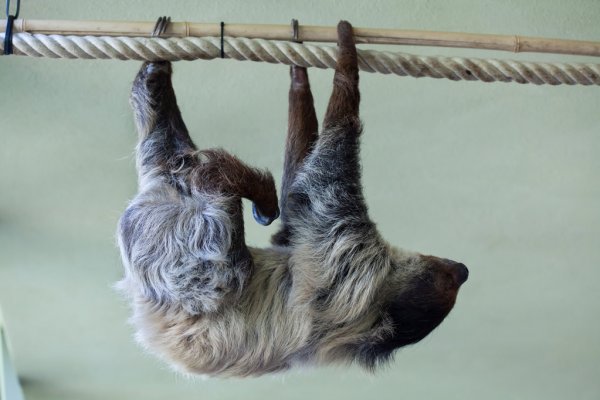ANIMAL: Linnaeus’s/Linne’s Two-Toed Sloth Choloepus didactylus Type of Animal: Sloth Habitat: Tropical/subtropical forest, cloud forest, can be found from sea level to as high as 8,000 ft Location(s): NE Peru, E Ecuador, S Colombia, S Venezuela, Guiana Shield, N Brazil Appearance: Grayish-brown to beige coat, round head, flat face, short dark nose, 2 clawed toes on forelegs, 3 clawed toes on hind legs Food/Diet: Vegetables, greens, fruit, leaves, stems, buds, shoots, nuts, blossoms, bark, flowers, insects, eggs, reptiles, berries, twigs, young/small birds, small rodents, carrion Status in Wild: Stable Conservation: Breeding in zoos, wildlife centers, & aquariums Lifestyle: Solitary though females sometimes seen in pairs or trios Additional Info: Called: Male Female Young: Pup Group: Bed Weight: Male: 16 lbs Female: 17 lbs Young: 3 lbs Gestation: 6-11.5 months Life Span: 15-20 years in wild, 35-40 years in captivity Height: 1.8-2.6 ft Body Length: 1.8-2.6 ft Tail Length: 0.5-1.5 in Main predators are raptors, jaguars, ocelots, large snakes, crocodilians, margays, & pumas. Most often active at night (nocturnal). Have very poor eyesight/hearing & rely on smell/touch to find food. One adaptation to life upside down is hair has part on belly allowing water to run off. Courtship consists of female licking male’s face & rubbing her genitals against his body. Though mostly quiet, young will make bleating alarm calls if separated from mom & females scream to attract males. Sexually mature at 2 years old. Young stay w/ mom for 8 months to 2 years. Young take solid food at 2-4 weeks & fully weaned at 9 weeks. Though stable, habitat loss & wildlife trafficking potential threats. Also called Southern two-toed sloth & unau. Fun Fact(s): Have lowest variable body temp of any mammal-75-86 degrees F. Well known to be extremely slow-moving, often moving at 0.46 ft/sec. In fact, this animal & the other 5 sloth species are world’s slowest moving mammals Can protect themselves by biting/clawing at potential threats. Have specialized hair encouraging algae growth, aiding in camouflage. Spend entire lives in trees, only coming to ground once a week to defecate/urinate or to change trees. Females even give birth upside down. Physically incapable of actually walking so they crawl when on ground. Surprisingly, they’re very good swimmers. Only need to defecate/urinate once a week due to extremely slow metabolism. Have 3-chambered stomach-1st 2 chambers hold symbiotic bacteria helping digest cellulose while 3rd chamber contains digestive glands. Often sleep for 18-20 hours a day.

